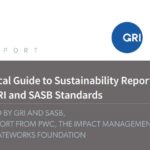Corporate Responsibility (CR) must be relevant to individual businesses according to new research from Ashridge, one of the worlds leading business schools, carried out in association with the British Quality Foundation (BQF).
Other key findings reveal that for CR to be successful it needs to be integrated into company – wide systems and be the subject for new thinking within and beyond the Board Room. The new research, Making Corporate Responsibility Work: Lessons from Real Business provides practical advice on integrating corporate responsibility (CR) into mainstream business practice. It is based on interviews with 10 UK companies* including Adnams, Carillion, Lloyds TSB, Vauxhall and Woolworths and will be launched in London on 3 June 2004 to over 60 managers.
The research starts by exploring how CR can be defined for individual organisations. Leon Olsen, author and researcher at the Ashridge Centre for Business and Society, says There is no one size fits all approach. An organisation needs to look carefully at its own situation, the business it operates in and what is important to its various stakeholders. Successful implementation of CR also involves recognising uncertainty and the fact that new aspects and challenges will unfold.
The research goes on to address some of the challenges for integrating CR. Middle management, who are largely responsible for day to day operations, are a key group to involve. If handled incorrectly CR can be perceived as an unwelcome distraction from their core roles. If implemented correctly, CR becomes a beneficial part of day to day operations.
Organisations interviewed agreed that CR provides significant benefits for the business, employees, customers, investors and society. It enables them to attract and retain competent and motivated people. In regulated environments or Plcs, CR is vital to ensuring a long-term licence to operate. Doing the right thing is simply increasingly important for leaders, managers and people.
Olsen adds Many organisations are only starting out on their CR journey, so it is impossible to assess the extent of its potential impact. Whilst this can be substantial, the co-operation of government, industry and communities will also be required in order to solve serious social and environmental problems. Many organisations will continue to work with this as part of their CR effort.
Joe Goasdoué, Chief Executive of BQF concludes We believe that this practical report provides advice that will be of real value to a wide range of organisations. We commissioned this study because there is a strong need to move away from theoretical models and highlight the good practical work being done in this country that other companies can learn from.
*Companies Interviewed Adnams Plc, AWG Plc, Carillion Plc, Go-Ahead Group Plc, Lloyds TSB Group Plc, mmO2 Plc, Ricoh UK Products Limited, Vauxhall Motors Limited, Woolworths Group Plc and Yell Group Plc.



